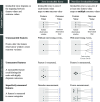The origins of unpredictability in life outcome prediction tasks
- PMID: 38833466
- PMCID: PMC11181083
- DOI: 10.1073/pnas.2322973121
The origins of unpredictability in life outcome prediction tasks
Abstract
Why are some life outcomes difficult to predict? We investigated this question through in-depth qualitative interviews with 40 families sampled from a multidecade longitudinal study. Our sampling and interviewing process was informed by the earlier efforts of hundreds of researchers to predict life outcomes for participants in this study. The qualitative evidence we uncovered in these interviews combined with a mathematical decomposition of prediction error led us to create a conceptual framework. Our specific evidence and our more general framework suggest that unpredictability should be expected in many life outcome prediction tasks, even in the presence of complex algorithms and large datasets. Our work provides a foundation for future empirical and theoretical work on unpredictability in human lives.
Keywords: life course; limits to prediction; machine learning; mixed methods; prediction.
Conflict of interest statement
Competing interests statement:The authors declare no competing interest.
Figures





Comment in
-
The value of qualitative data in understanding failure in prediction.Proc Natl Acad Sci U S A. 2024 Jul 9;121(28):e2409327121. doi: 10.1073/pnas.2409327121. Epub 2024 Jun 27. Proc Natl Acad Sci U S A. 2024. PMID: 38935583 Free PMC article. No abstract available.
Similar articles
-
The future of Cochrane Neonatal.Early Hum Dev. 2020 Nov;150:105191. doi: 10.1016/j.earlhumdev.2020.105191. Epub 2020 Sep 12. Early Hum Dev. 2020. PMID: 33036834
-
Machine learning algorithms, bull genetic information, and imbalanced datasets used in abortion incidence prediction models for Iranian Holstein dairy cattle.Prev Vet Med. 2020 Feb;175:104869. doi: 10.1016/j.prevetmed.2019.104869. Epub 2019 Dec 17. Prev Vet Med. 2020. PMID: 31896505
-
Dynamic prediction of psychological treatment outcomes: development and validation of a prediction model using routinely collected symptom data.Lancet Digit Health. 2021 Apr;3(4):e231-e240. doi: 10.1016/S2589-7500(21)00018-2. Lancet Digit Health. 2021. PMID: 33766287
-
Applications of machine learning algorithms to predict therapeutic outcomes in depression: A meta-analysis and systematic review.J Affect Disord. 2018 Dec 1;241:519-532. doi: 10.1016/j.jad.2018.08.073. Epub 2018 Aug 14. J Affect Disord. 2018. PMID: 30153635
-
Data-driven modeling and prediction of blood glucose dynamics: Machine learning applications in type 1 diabetes.Artif Intell Med. 2019 Jul;98:109-134. doi: 10.1016/j.artmed.2019.07.007. Epub 2019 Jul 26. Artif Intell Med. 2019. PMID: 31383477 Review.
Cited by
-
Large language models predict cognition and education close to or better than genomics or expert assessment.Commun Psychol. 2025 Jul 3;3(1):95. doi: 10.1038/s44271-025-00274-x. Commun Psychol. 2025. PMID: 40610612 Free PMC article.
-
The value of qualitative data in understanding failure in prediction.Proc Natl Acad Sci U S A. 2024 Jul 9;121(28):e2409327121. doi: 10.1073/pnas.2409327121. Epub 2024 Jun 27. Proc Natl Acad Sci U S A. 2024. PMID: 38935583 Free PMC article. No abstract available.
-
Using machine learning to explore the efficacy of administrative variables in prediction of subjective-wellbeing outcomes in New Zealand.Sci Rep. 2025 Feb 25;15(1):6831. doi: 10.1038/s41598-025-90852-0. Sci Rep. 2025. PMID: 40000735 Free PMC article.
-
The InterModel Vigorish (IMV) as a flexible and portable approach for quantifying predictive accuracy with binary outcomes.PLoS One. 2025 Mar 21;20(3):e0316491. doi: 10.1371/journal.pone.0316491. eCollection 2025. PLoS One. 2025. PMID: 40117240 Free PMC article.
References
-
- Van Creveld M., Seeing Into the Future: A Short History of Prediction (Reaktion Books, 2020).
-
- Reichman N. E., Teitler J. O., Garfinkel I., McLanahan S. S., Fragile Families: Sample and design. Child. Youth Serv. Rev. 23, 303–326 (2001).
-
- Chouldechova A., Fair prediction with disparate impact: A study of bias in recidivism prediction instruments. Big Data 5, 153–163 (2017). - PubMed
MeSH terms
Grants and funding
- R01 HD039135/HD/NICHD NIH HHS/United States
- 1760052/National Science Foundation (NSF)
- R24 HD047879/HD/NICHD NIH HHS/United States
- P2-CHD047879/HHS | NIH | Eunice Kennedy Shriver National Institute of Child Health and Human Development (NICHD)
- R01-HD36916 R01-HD39135 R01-HD40421/HD/NICHD NIH HHS/United States
LinkOut - more resources
Full Text Sources

